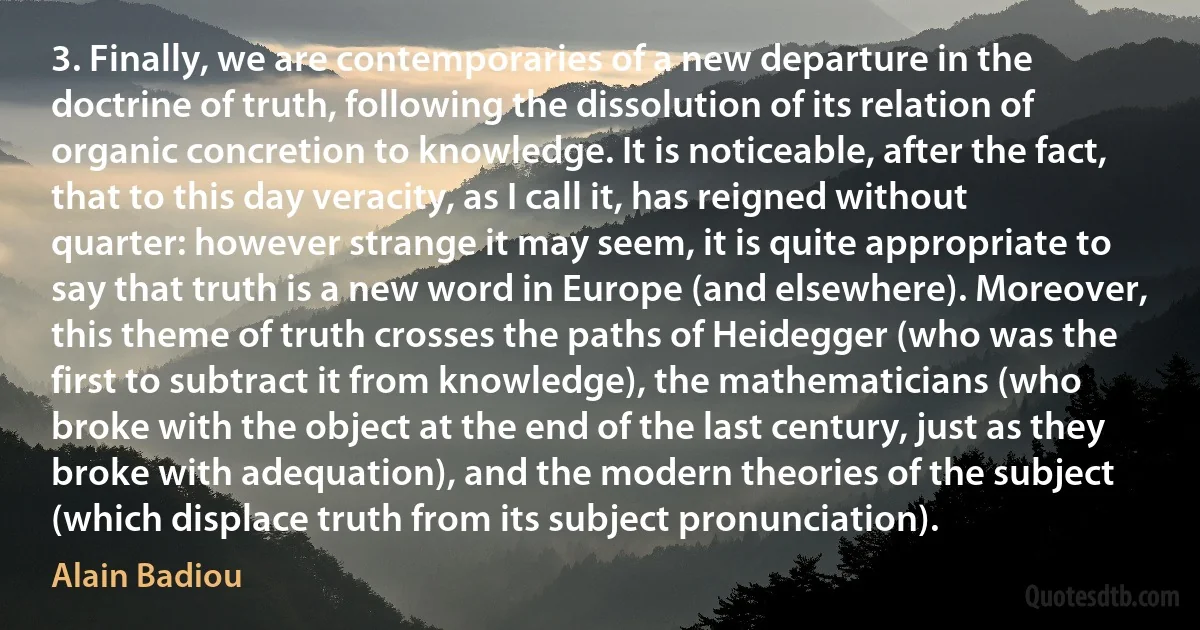
3. Finally, we are contemporaries of a new departure in the doctrine of truth, following the dissolution of its relation of organic concretion to knowledge. It is noticeable, after the fact, that to this day veracity, as I call it, has reigned without quarter: however strange it may seem, it is quite appropriate to say that truth is a new word in Europe (and elsewhere). Moreover, this theme of truth crosses the paths of Heidegger (who was the first to subtract it from knowledge), the mathematicians (who broke with the object at the end of the last century, just as they broke with adequation), and the modern theories of the subject (which displace truth from its subject pronunciation).
Alain BadiouRelated topics
broke call century contemporaries day dissolution doctrine elsewhere end following knowledge last organic pronunciation quite say strange theme truth veracity word HeideggerRelated quotes
You may not be her first, her last, or her only. She loved before she may love again. But if she loves you now, what else matters? She's not perfect-you aren't either, and the two of you may never be perfect together but if she can make you laugh, cause you to think twice, and admit to being human and making mistakes, hold onto her and give her the most you can. She may not be thinking about you every second of the day, but she will give you a part of her that she knows you can break-her heart. So don't hurt her, don't change her, don't analyze and don't expect more than she can give. Smile when she makes you happy, let her know when she makes you mad, and miss her when she's not there.

Bob Marley
A quarter of a century was to elapse between the time when I saw my father sitting with the strange woman and the time when I was to see him again, standing alone upon the red clay of a Mississippi plantation, a sharecropper, clad in ragged overalls, holding a muddy hoe in his gnarled, veined hands-a quarter of a century during which my mind and consciousness had become so greatly and violently altered that when I tried to talk to him I realized that, though ties of blood made us kin, though I could see a shadow of my face in his face, though there was an echo of my voice in his voice, we were forever strangers, speaking a different language, living on vastly distant planes of reality.

Richard Wright
The real struggle today, just as in the second quarter of the nineteenth century, is between a view of the world termed liberalism or radicalism, for which the primary object of government and of foreign policy is peace, freedom of trade and intercourse, and economic wealth and that other view, militarist or rather diplomatic, which thinks in terms of power, prestige, national or personal glory, the imposition of a culture and hereditary or racial prejudice. To the good English radical, the latter is so unreal, so crazy in its combination of futility and evil, that he is often in danger of forgetting or disbelieving its actual existence.

John Maynard Keynes
It is not infrequently our custom to seek to cover our own blank ignorance of certain subjects with the confident assertion that nothing ever has been or can be really known... and our treatment of this question of the life after death is one of the worst examples of this habit. If popular theology had not most unhappily altogether lost sight of the cardinal doctrine of reincarnation, its· views on this subject of death would naturally be entirely different. A man who realizes that he has died many times before regards the operation more philosophically than one who believes it to be an absolutely new experience fraught with all kinds of vague· and awful possibilities.

Charles Webster Leadbeater
In another place, this learned geographer (Strabo), in alluding to the tradition that Sicily had been separated by a convulsion from Italy, remarks, that at present the land near the sea in those parts was rarely shaken by earthquakes, since there were now open orifices whereby fire and ignited matters and waters escaped; but formerly, when the volcanoes of Etna, the Lipari Islands, Ischia, and others, were closed up, the imprisoned fire and wind might have produced far more vehement movements. The doctrine, therefore, that volcanoes are safety valves, and that the subterranean convulsions are probably most violent when first the volcanic energy shifts itself to a new quarter, is not modern.

Charles Lyell
